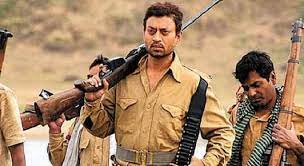
Divya Delhi: As Richard Attenborough embodies Mahatma Gandhi, Irrfan portrays Tomar, a forgotten hero who turned to banditry when he left athletics. A surefire national award for Irrfan Khan as the disgraced athlete turned Bandit King? Who can steal Irrfan's moment of glory? Unless politics. Irrfan's sprinting body language and emotions of pain and indignation at being treated with no regard by a culture he brought international honor to were so accurate that they were immediately compared to the best biographical performances. This ranks with Robert Downey Jr.'s Chaplin. Budgetary constraints hindered Tigmanshu Dhulia's earlier films. He skillfully told Tomar's story, flirting with infinity. Some films should go beyond being cinematic. With the names of real-life athletes who died unheralded flashing across the screen at the end of Paan Singh Tomar, we realize we've seen more than film in 190 minutes. It describes the fate of those who don't fit social norms of success. As Paan Singh Tomar, Irrfan Khan exemplifies the criminal disregard of all athletes in our country except cricketers, who are greatly overvalued. Tomar raced steeplechase. Not that it changed his fate. After a long career in the service, Tomar retired to care for his family and village. Dhulia's compelling writing, which spares no time for self-indulgent editing, shines here. Instead of tackling the steeplechase, Tomar took up arms to avenge his family. There are obstacles. Some unsurmountable. Paan Singh Tomar's two lives—as a famed athlete in the army and an outlaw on the run in the Chambal valley (not on a horse!)—are brilliantly and hauntingly intertwined. Paan Singh Tomar is technically polished, with editing (Aarti Bajaj) and background score (Sandeep Chowta) providing depth to the drama of the motivated athlete. Dhulia's past films suffered from a lack of finance. The film's cinematography by Aseem Mishra is a captivating mix of authenticity and poetry. Tigmanshu Dhulia's training as a raconteur of social injustice and damning outlawry stems from his work with Shekhar Kapoor's Bandit Queen. Dhulia avoids the conspicuous savagery that made Phoolan Devi a social outcast by depicting Paan Singh's rise from acclaimed athlete to wanted bandit. Few violent scenes appear in Paan Singh Tomar. In practically every frame, the heart bleeds heavily and invisibly. The underlying question of why we mistreat our athletes and the wider question of social inequity and lawlessness trail the narrative. Paan Singh Tomar is always liberating, unlike other socially conscious flicks. Irrfan Khan's lead performance is largely responsible for the film's sledgehammer effect. Paan Singh Irrfan is perfect. He gets every shot right throughout the film. The character's convoluted life is unambiguously interpreted by his intuitive awareness of his fate. It goes beyond character speech and body language. Irrfan exceeds.
- Education(148)
- India(771)
- Entertainment(399)
- Sports(272)
- Business(226)
- Bollywood Hollywood(95)
- International(196)
- Life & Style(91)
- Opinion(139)
- Educational(5)
- Crime(7)
- Technical(6)
- World(18)


